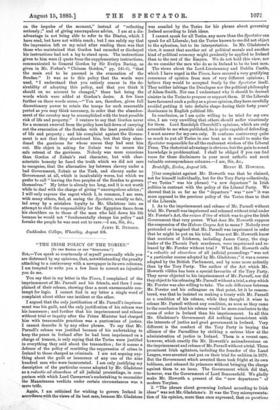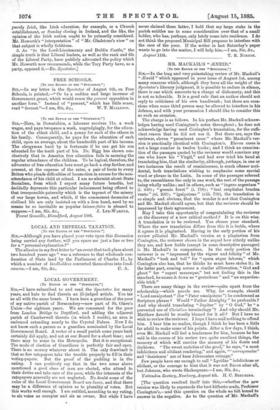"THE IRISH POLICY OF THE TORIES." [To THE EDITOR OF
THE " EPECTATOR.".] SIR,—You speak so courteously of myself personally while you are distressed by my opinions, that, notwithstanding the penalty attaching to a controversy with a newspaper in its own columns,
I am tempted to write you a few lines to correct an injustice you do me.
You say that in my letter in the Times, I complained of the imprisonment of Mr. Parnell and his friends, and then I com- plained of their release, showing thus a most unreasonable con- tempt for logic. I cannot find in my letter a single word of complaint about either one incident or the other.
I argued that the only justification of Mr. Parnell's imprison- ment was his guilt, and the only justification of his release was his innocence ; and further that his imprisonment and release without trial or inquiry after the Prime Minister had charged him with treasonable practices was a pantomime of justice.
I cannot describe it by any other phrase. To say that Mr. Parnell's release was justified because of his undertaking to keep the peace in Ireland after he had been imprisoned on a charge of treason, is only saying that the Tories were justified in everything they said about the transaction ; for it means a defence of the policy of remitting the suppression of crime in Ireland to those charged as criminals. I am not arguing any- thing about the guilt or innocence of any one of the nine hundred men who were incarcerated. I am only justifying my description of the particular course adopted by Mr. Gladstone as a redv,ctio ad absurdum of all judicial proceedings, in com- parison with which Lord Carnarvon's undertaking to reconsider the Maamtrasna verdicts under certain circumstances was a mere trifle.
Again, I am criticised for wishing to govern Ireland in accordance with the views of its best men, because Mr. Gladstone was assailed by the Tories for his phrase about governing Ireland according to Irish ideas.
I cannot speak for all Tories, any more than the Spectator can speak for all Liberals ; but the Tories known to me did not object to the aphorism, but to its interpretation. In Mr. Gladstone's view, it meant that another set of political morals and another kind of political economy might prudently be applied to Ireland than to the rest of the Empire. We do not hold this view, nor do we consider the men who do so in Ireland to be its best men.
The views about the Lord-Lieutenancy and Dublin Castle, which I have urged in the Times, have secured a very gratifying consensus of opinion from men of very different opinions ; I believe they would be accepted freely by the Spectator itself. They neither infringe the Decalogue nor the political philosophy of Adam Smith. Nor can I understand why it should be deemed sinister in the Tories to propose or support them. If the Liberals have favoured such a policy as a pious opinion, they have carefully avoided putting it into definite shape during their forty years' dominance in English political life.
In conclusion, as I am quite willing to be tried for my own sins, I am very unwilling that others should suffer vicariously for them. Lord Randolph Churchill's opinions, which are only accessible to me when published, he is quite capable of defending. I must answer for my own only. It confuses controversy quite as much to put all Tories in one boat as it would to make the Spectator responsible for all the exuberant wisdom of the Liberal Press. The rhetorical advantage is obvious, but the gain to sound knowledge is problematical. I shall be obliged if you can find room for these disclaimers in your most catholic and most valuable correspondence columns.—I am, Sir, &c., [Our complaint against Mr. Howorth was that he claimed, not for himself individually, but for the Tory Party collectively, (" we Tories" was his phrase) "a new departure" in Irish politics in contrast with the policy of the Liberal Party. We showed that in so far as the " departure " was " new" it was more opposed to the previous policy of the Tories than to that of the Liberals.
1. As to the imprisonment and release of Mr. Parnell without trial. Mr. Parnell was imprisoned and released without trial under Mr. Forster's Act, the raison cl'are of which was to give the Irish Government that very power. What does Mr. Howorth suppose the suspension of the Habeas Corpus Act to mean P Nobody ever pretended or imagined that Mr. Parnell was imprisoned in order that he might be put on his trial. Does not Mr. Howorth know that numbers of Irishmen, including James Carey, the ring- leader of the Phcenix Park murderers, were imprisoned and re- leased by Mr. Forster without trial P What Mr. Howorth calls "a reductio ad absurdum of all judicial proceedings "was not " a particular course adopted by Mr. Gladstone ;" it was a course adopted by the British Parliament, and by none more ardently than by the Tory Party. The author of the Act which Mr. Howorth vilifies has been a special favourite of the Tory Party. They never objected to his imprisonment of Mr. Parnell, nor did they object to his releasing Mr. Parnell without a trial, a step which Mr. Forster was also willing to take. The sole difference between Mr. Forster and his colleagues on that point, let it be remem- bered, was that he insisted on making a treaty with Mr. Parnell as a condition of his release, while they thought it wiser to release Mr. Parnell without any condition, as soon as they came to the conclusion that his release would be more conducive to the cause of order in Ireland than his imprisonment. In all this Mr. Gladstone's Government did nothing inconsistent with the interests of justice and good government in Ireland. Very different is the conduct of the Tory Party in buying the alliance of the Parnellites by striking a serious blow at the administration of justice in Ireland. There is a recent case, however, which exactly fits Mr. Howorth's animadversions on the imprisonment and release of Mr. Parnell without a trial. Three prominent Irish agitators, including the founder of the Land League, were arrested and put on their trial for sedition in 1879. Bnt the Government which arrested them took fright at its own boldness, and released its prisoners without bringing the charge against them to an issue. The Government which did that, however, was the Government of Lord Beaconsfield. We gladly make Mr. Howorth a present of the " new departures " of modern Toryism.
2. "The phrase about governing Ireland according to Irish ideas" was not Mr. Gladstone's. It was the Tory misrepresenta- tion of his opinion, more than once expressed, that on questions
pswely Irish, like Irish education, for example, or a Church establishment, or Sunday closing in Ireland, and the like, the opinion of the Irish nation ought to be primarily considered. Mr. lloworth's " interpretation " of " Mr. Gladstone's view " on that subject is wholly fictitious.
3. As "to the Lord-Lieutenancy and Dublin Castle," the simple troth is that Liberal leaders, as well as the rank and file of the Liberal Party, have publicly advocated the policy which Mr. Howorth now recommends, while the Tory Party have, as a party, opposed it.—En. Spectator.]



































 Previous page
Previous page